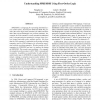Free Online Productivity Tools
i2Speak
i2Symbol
i2OCR
iTex2Img
iWeb2Print
iWeb2Shot
i2Type
iPdf2Split
iPdf2Merge
i2Bopomofo
i2Arabic
i2Style
i2Image
i2PDF
iLatex2Rtf
Sci2ools
136
click to vote
CSFW
2003
IEEE
2003
IEEE
Understanding SPKI/SDSI Using First-Order Logic
SPKI/SDSI is a language for expressing distributed access control policy, derived from SPKI and SDSI. We provide a first-order logic (FOL) semantics for SDSI, and show that it has several advantages over previous semantics. For example, the FOL semantics is easily extended to additional policy concepts and gives meaning to a larger class of access control and other policy analysis queries. We prove that the FOL semantics is equivalent to the string rewriting semantics used by SDSI designers, for all queries associated with the rewriting semantics. We also provide a FOL semantics for SPKI/SDSI and use it to analyze the design of SPKI/SDSI. This reveals some problems. For example, the standard proof procedure in RFC 2693 is semantically incomplete. In addition, as noted before by other authors, authorization tags in SPKI/SDSI are algorithmically problematic, making a complete proof procedure unlikely. We compare SPKI/SDSI with RTC 1 , which is a language in the RT Role-based Trust-mana...
Related Content
| Added | 04 Jul 2010 |
| Updated | 04 Jul 2010 |
| Type | Conference |
| Year | 2003 |
| Where | CSFW |
| Authors | Ninghui Li, John C. Mitchell |
Comments (0)

